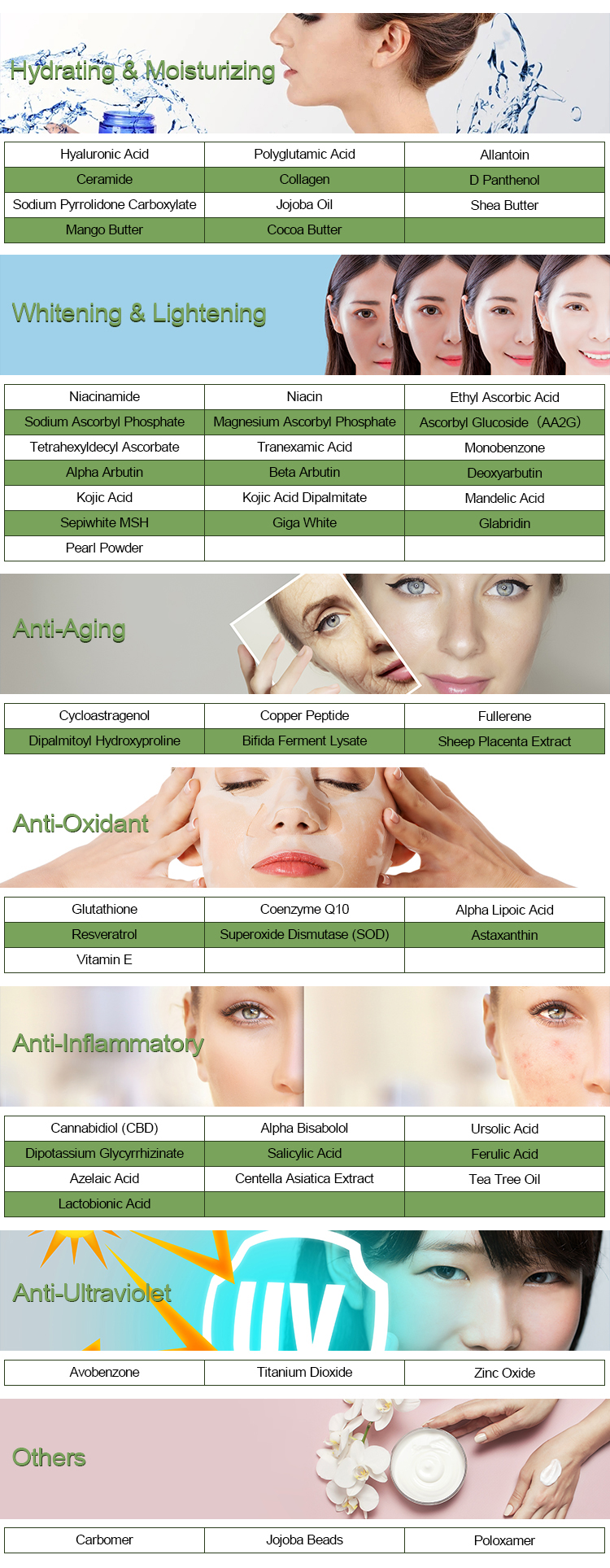Nicotinamide, also known as niacinamide or nicotinic acid amide, is a form of vitamin B3 (niacin). It is an essential nutrient that the human body needs for various biological processes. Nicotinamide is a water-soluble compound that is commonly found in food sources such as meat, fish, nuts, and grains, and it can also be synthesized within the body from other dietary precursors.
Nicotinamide plays a crucial role in several biochemical reactions, including:
1.Energy Metabolism: Nicotinamide is a key component of coenzymes NAD (nicotinamide adenine dinucleotide) and NADP (nicotinamide adenine dinucleotide phosphate), which are involved in the conversion of food into energy through processes like glycolysis and the citric acid cycle.
2.DNA Repair: It is involved in DNA repair mechanisms, helping to maintain the integrity of genetic material.

3.Cell Signaling: Nicotinamide participates in cellular signaling pathways, influencing processes such as gene expression, cell differentiation, and apoptosis (programmed cell death).
4.Skin Health: Topical nicotinamide is used in various skincare products due to its potential benefits for skin health. It is believed to have anti-inflammatory properties and can help in reducing the appearance of acne, fine lines, and hyperpigmentation.
5.Neurological Health: Some research suggests that nicotinamide may have neuroprotective effects and could potentially play a role in preventing or managing neurological conditions.
Nicotinamide deficiency can lead to a condition called pellagra, which is characterized by symptoms like dermatitis (skin inflammation), diarrhea, and dementia. However, severe nicotinamide deficiency is relatively rare in developed countries due to its presence in many foods and its synthesis within the body.
Nicotinamide is available as a dietary supplement and is sometimes used in medical treatments, but it’s important to consult with a healthcare professional before taking any supplements to ensure proper dosage and suitability for individual needs.
How to use Nicotinamide?
Nicotinamide, also known as niacinamide or vitamin B3, is a water-soluble vitamin that plays a crucial role in various bodily functions. It is commonly used for skin health and may also have other health benefits. Here are some common ways to use nicotinamide:
1.Topical Application for Skin Health:
- Skincare Products: Nicotinamide is often included in skincare products like creams, serums, and lotions. It can help improve the overall appearance of the skin, reduce redness, and support the skin’s natural barrier.
2.Oral Supplements:
- Dietary Supplements: Nicotinamide is available in the form of dietary supplements such as capsules, tablets, and powders. These supplements are commonly used to support overall health and well-being.
3.For Specific Health Conditions:
- Pellagra: Nicotinamide is used to treat and prevent pellagra, a rare nutritional deficiency disease caused by insufficient niacin intake.
4.Prescribed by a Healthcare Professional:
- Nicotinamide may be prescribed by a healthcare provider for specific medical conditions. The dosage and usage instructions should be followed as directed by your healthcare professional.

It’s important to note that nicotinamide is generally considered safe when used as directed. However, if you are considering using nicotinamide supplements or skincare products for a specific health concern, it’s advisable to consult with a healthcare provider or dermatologist first, especially if you have any underlying medical conditions or are taking medications, as they can provide guidance on the appropriate dosage and usage.
As with any supplement or skincare product, it’s essential to follow the recommended dosages and usage instructions provided on the product label or as directed by a healthcare professional to avoid potential side effects or adverse reactions. Additionally, maintaining a balanced diet that includes foods rich in vitamin B3 can help ensure you get an adequate amount of nicotinamide through your diet.
